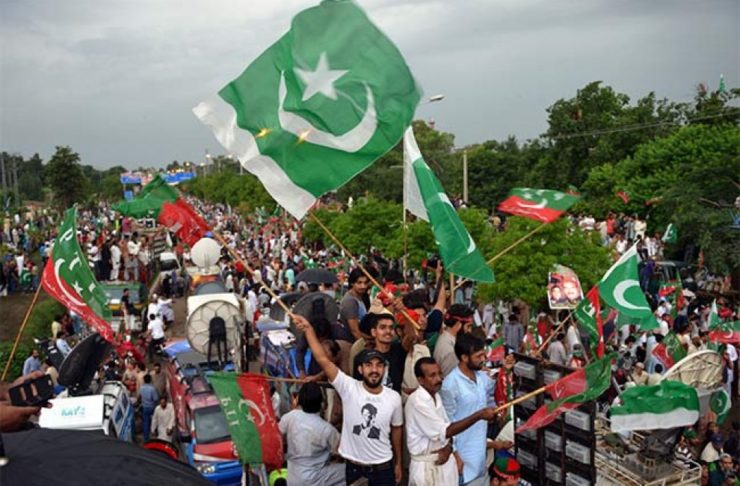
Since the country’s inception, democracy in Pakistan has been facing numerous obstacles. The main reason behind the failure of the democratic system is the political ambitions of the country’s leading political elite. Ironically, none of the incumbent top political leaders of Pakistan hold a purely democratic history. The leaders of the top three political parties have been conspiring with the non-democratic forces in the country to gain power. The forefathers of the country chose democracy as the best suitable form of government for Pakistan, given its ethnic and religious diversity. However, the demise of the founder of Pakistan, Quaid e Azam Muhammad Ali Jinnah, only one year after the creation of the country sparked a leadership crisis in the country. Pakistan scrambled to find a visionary leader in this crisis as the reigns of the government were taken over by the illiterate feudal lords of the country.
It took Pakistan almost 9 years to develop its first constitution. The military establishment took over the civilian government in the country soon after the development of this constitution. General Ayub Khan became the first field marshal of the country and imposed the first martial law in Pakistan on 27th October 1958. This martial law continued for almost 11 years in the country. In 1970, Pakistan held its first-ever direct general elections. The voter turnout was 57.96 percent in this election, the highest in the history of the country. However, these elections resulted in the dismemberment of the Eastern wing of Pakistan. The Awami League led by Sheikh Mujib ur Rehman won these elections. But Zulfiqar Ali Bhutto, the leader of the Pakistan People’s Party, attempted to mar the establishment of the first democratic government in Pakistan. He refused to let Mujib ur Rehman form a government in the country. According to G.W Choudhury, in his book, “The Last Days of United Pakistan,” Zulfiqar Ali Bhutto said, “If have to choose between two P’s – power and Pakistan, I will go with the former one.
This laid the foundation for the role of non-democratic forces in Pakistan. The country went into a civil war in 1971 due to his non-democratic attitude, coupled with many other historical and cultural issues. Pakistan lost its Eastern wing as a result of this war. Nonetheless, he succeeded in establishing his government in the country. The Federal Security Force (FSF) was created by him to suppress his political opponents. Allegedly, he also used the intelligence agency to gain political leverage and to target his opponents. Many inside the country hold that the use of the country’s military intelligence agency for political purposes resulted in the political involvement of non-democratic forces in governmental affairs. Ultimately, Zulfiqar Ali Bhutto’s government was toppled by the then Army Chief, General Zia ul Haq. Other politicians in the country also followed suit. Pakistan’s two top-notch leaders, Late Benazir Bhutto and Nawaz Sharif, have been conspiring against each other since the military establishment of the country in the 1990s.
This led to the derailing of the democratic process in Pakistan in 1999 for almost a decade. This military coup led to a consciousness among the political elite of the country. On the other hand, the military establishment also showed restraint from meddling in political affairs. However, over time, strain in civil-military relations once again allowed the opposition leaders in the country to conspire with the establishment in Pakistan. In 2018, Former Prime Minister Imran Khan rose to the echelons of power with the help of the country’s establishment. During his tenure, his cabinet members and party ministers used to glorify the hybrid form of government in the country. Imran Khan publicly endorsed the political interference of the country’s military establishment. Political opponents of Imran Khan were penalized during his tenure by the hybrid government established in Pakistan. However, just like the past, this civil-military experience once again failed in the country and PM Imran Khan lost his government due to lack of support from the establishment due to differences over some issues.
Despite decades of bitter experiences, it seems that political leaders in Pakistan have learned nothing. The February 8th elections in Pakistan are considered highly controversial. There is a common belief in the country that PML(N) – led by Nawaz Sharif – will gain the power due to its, alleged, covert nexus with the security establishment. Allegedly, Pakistan is going to have another experience of the hybrid form of government. However, if this perception is true, it is destined to fail, given past experiences. Moreover, the personal ambitions of the political leaders of the country are the most significant cause behind the alleged role of the establishment in the country’s politics. Pakistan’s political leaders need to learn that they should cease cooperation with non-democratic forces to make democracy work in the country. Furthermore, they should prioritize the greater good over their personal ambitions to strengthen the country financially. Politicians in Pakistan should also promote democratic norms within their parties to promote democracy in the country. Otherwise, the political polarization in the country will further enfeeble the already stagnant economy of the country. Strengthening civilian institutions through meritocracy will also help the country to keep non-democratic forces at bay.
Abbas Hashemite – is a political observer and research analyst for regional and global geopolitical issues. He is currently working as an independent researcher and journalist, exclusively for “New Eastern Outlook”.